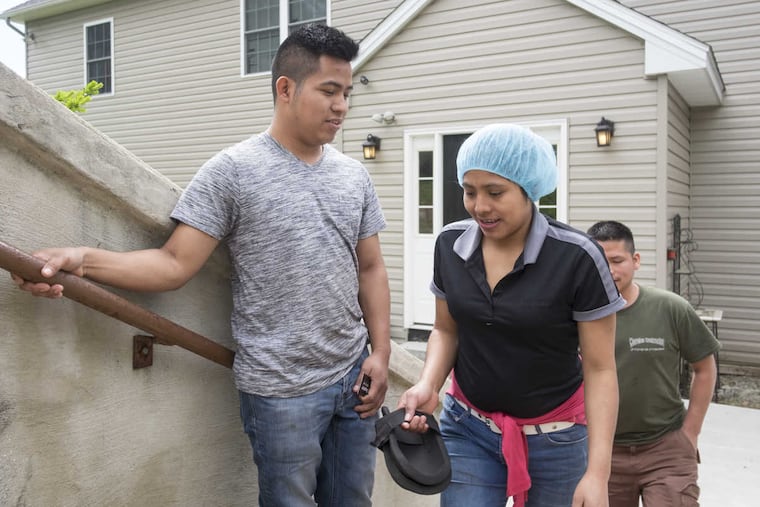After ICE raid at Chesco mushroom farm, anxiety high among immigrant workers
The incident, in which a dozen men were arrested, appeared to be the first big workplace raid in mushroom country since the 1990s -- and a sign of a newly energized hunt for undocumented immigrants.

In a poor immigrant community where anxiety has never been a stranger, nerves these days could not be more frayed.
Rumors of sightings of federal customs agents around southern Chester County's mushroom farms are rife, keeping some people from venturing out of their homes. Appointments for social services, however critical to Hispanic clients, are being canceled at an unprecedented rate. At a small Mexican specialty shop decked with the red, white, and blue of an American flag, and the green, white, and red of Mexico's, the talk is of the government's newly energized hunt for undocumented prey.
And it is all because of what happened shortly after dawn on Wednesday, April 26, inside a dank, cinder-block grow house lined with long beds of creamy white mushrooms.
Priscilla Aguilar Chun's shift as a picker at South Mill's Kaolin Farms branch in Avondale was just getting started at 7 a.m. when the 21-year-old saw eight U.S. Immigration and Customs Enforcement agents in khaki slacks and protective vests entering the windowless room where she and a dozen other Latino immigrants labored.
The agents carried photographs of four men they said they were seeking. None of the targets was present, but that didn't seem to matter, Chun said. The agents blocked the exits and interrogated the workers one by one. An hour later, 12 men, including her 26-year-old boyfriend, were arrested and handcuffed in pairs, one man's right wrist to another's left. Taken in a white van to ICE's Philadelphia field office, they were booked and shipped to York County Prison, where they face deportation.
Art Read, a longtime attorney with Friends of Farmworkers, a Pennsylvania advocacy center for migrant workers, said the incident appeared to be the first big workplace raid in mushroom country since the 1990s -- and a sign of the new priorities ordered in January by President Trump, who wants anyone found to be living here unlawfully to be jailed and ultimately removed.
The Chester County hills around Kennett Square are the heart of a $500 million mushroom industry that has provided jobs for successive waves of immigrants -- Quakers, Irish, Italians, Central Americans. It also has been a magnet for some without proper papers.
Caitlin Barry, director of the Farmworker Legal Aid Clinic at Villanova University Law School, has twice visited the men in prison and is trying to get them legal representation. She said at least eight appear to have no criminal record, and no prior contact with ICE. The others are facing orders of expedited removal.
Barry, Read, and other lawyers have questioned the constitutionality of the raid because it is not clear under what circumstances the ICE agents were permitted to search on private property.
South Mill did not respond to repeated requests for an interview.
However, a day after the arrests, company owner Michael Pia told NBC10, "I do not believe they had a warrant, or no one told me that there was one." Pia said that the men arrested were not employees of South Mill but were hired through a subcontractor and assigned to the Avondale branch. The report did not name the subcontractor.
In a statement sent to the Inquirer and Daily News on Thursday, ICE said that it "does not conduct sweeps or raids that target aliens indiscriminately" and that the people swept up at Kaolin were arrested "in a targeted enforcement operation."
Asked whether the agents had Kaolin's consent, or a judicial warrant permitting them to search the private property, ICE spokesman in Philadelphia Adrian Smith said the agents had the permission of a supervisor, whom he did not identify.
The lawyers say they will dig deeper into those circumstances in conversations with their clients.
While questions remain, the chilling effect of the raid is evident.
"People are afraid to leave their houses," said Alisa Maria Jones, president and CEO of La Comunidad Hispana, a nonprofit that has provided health and social services in Kennett Square since 1973. "That fear and anxiety, especially among children, is harmful to this community."
On the day after the raid, she said, 24 percent of the clients scheduled to come to Comunidad Hispana canceled their appointments. The previous Thursday, the no-show rate was 7 percent.
The raid's ripple effect was felt at Casa Norma, the flag-adorned Mexican specialty shop with a large selection of cowboy boots and hats, soccer cleats, sports jerseys, and snacks from south of the border. Shopkeeper Betty Ramirez said customer gossip, sometimes driven by Facebook, is often filled with rumors of more raids.
Not far from the shop, at the legal offices of Sweet & Paciorek, lawyer Lindsey Sweet said she has picked up two new clients from among the dozen men arrested. She is just getting started with preparations for their defense, but already one thing has jumped out at her.
"Nobody knew anything about the four men the agents said they were looking for," she said. "Which makes it seem more like a ruse than anything else."
While a law office might ordinarily expect more inquiries when anxieties are running high, she said, this raid seems to have produced an opposite effect.
"Until this past week, I was booked six to seven weeks out for consultations with people wanting to know what their options were, trying to pursue new forms of relief, wanting to be proactive," she said. "People are still showing up for their consultations. But in general, there seems to be a fear of not wanting to push the envelope, not wanting to file something that might put them in jeopardy."